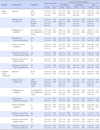Abstract
Purpose
The purpose of this study was to investigate the level of cultural competency of visiting nurses and community health practitioners and explore factors that are related with their cultural competency.
Methods
The subjects of this study were 113 visiting nurses and 103 community health practitioners working in Gangwon-do. Data were collected using a structured questionnaire on May 24, 2011. The SPSS/WIN 17.0 program was used for data analysis.
Results
The average score for cultural competency of visiting nurses was 2.76±0.60 and that of community health practitioners 2.91±0.51. Most of subjects received no multicultural education (78.0% for nurses, 85.7% for community health nurses). Factors influencing cultural competency were number of service experience for multicultural clients and participation of multicultural education.
Figures and Tables
Table 2
Comparison of Cultural Competency between Visiting Nurses and Community Health Practitioners (N=216)

References
1. Ahn YH. Health status and health behavior of immigrant women married to Koreans. Journal of Korean Academy of Public Health Nursing. 2008. 22(1):18–26.
2. Allison PD. Multiple regression: A primer. 1999. Thound Oaks: Sage.
3. nderson NL, Calvillo ER, Fongwa MN. Community-based approaches to strengthen cultural competency in nursing education and practice. Journal of Transcultural Nursing. 2007. 18:1 Suppl. 49S–59S.
4. Betancourt JR, Green AR, Carrillo JE, Ananeh-Firempong O. Defining cultural competence: A practical framework for addressing racial/ethnic disparities in health and health care. Public Health Reports. 2003. 118(4):293–302.

5. Boyle DA, Sheridan A, McClary J, White J. A multifocal education strategy to enhance hospital-based Cultural competency in professional staff. Oncology Nursing Forum. 2002. 29(5):764–768.

6. Burchum J. Cultural competence: An evolutionary perspectives. Nursing Forum. 2002. 37(4):5–15.
7. Chae DH, Park YH, Kang KH, Lee TH. A study on factors affecting cultural competency of general hospital nurses. Journal of Korean Academy of Nursing Administration. 2012. 18(1):76–86.

8. Cronin MS. Enhancing the cultural competence of social workers. 2005. New York, USA: Veshiva University;Unpublished doctoral dissertation.
9. Faul F, Erdfelder E, Lang A, Buchner A. G*Power 3: A flexible statistical power analysis for the social, behavioral, and biomedical sciences. Behavior research methods. 2007. 39(2):175–191.
10. Hyun JH. The factor affecting cultural capacity of those engaged in social welfare facility. 2011. Gwangju: Honam University;Unpublished master's thesis.
11. Jin KN, Kim JJ, Sung DH, Hwang SK, Jung WJ. Cultural competence of global healthcare providers in healthcare setting: Case study of Seoul area. Health and Social Welfare Review. 2010. 30(2):581–598.
12. Kim MK. A qualitative study on university students' multicultural competence-focusing on the cultural cognition, cultural knowledge and cultural skill-. Korean Journal of Human Ecology. 2010. 19(6):945–965.
13. Kim YJ, Lee JY, Cho SH. An explorative study of perceived cultural competency of medical social workersin Korea. Health and Social Welfare Review. 2011. 31(3):251–283.
14. Koh CK, Koh SK. Married female migrants' experiences of health care services. The Journal of Korean Academic Society of Nursing Education. 2009. 15(1):89–99.

15. Lara M, Gamboa C, Kahramanian MI, Morales LS, Bautista DE. Acculturation and Latino health in the United States: A review of the literature and its sociopolitical context. Annual Review of Public Health. 2005. 26:367–397.

16. Lee JI. Study on relationship between cultural competency and empathy of nurses. 2011. Hallym University: Chuncheon;Unpublished master's thesis.
17. Lim EM, Jeong SJ, Lee SJ. Marriage-based immigrant women's cultural adaptation types and acculturation stress. The Korea Journal of Counseling. 2010. 11(3):957–973.
18. Lum D. Culturally competent practice: A framework for understanding diverse groups and justice issues. 2003. Pacific Grove, CA: Brooks/Cole Cengage Learning.
19. Min SH, Lee MY. A exploratory study about the cultural competence of university students -focused on the cultural awareness-. Journal of Adolescent Welfare. 2009. 11(1):183–206.
20. Min SY. An exploratory study on cultural competence of social worker. Students Journal of Social Welfare. 2008. 1:1–28.
21. Ministry of Health and Welfare. Manual for home visiting health service. 2012. Seoul: Author.
22. Ministry of Justice. Korea immigration service annual statistics. 2011. Retrieved September 20, 2011. from http://www.index.go.kr/egams/stts/jsp/potal/stts/PO_STTS_IdxMain.jsp?idx_cd=2756.
23. Moon GW, Bae JJ. Development of cultural competencytraining model for the experts working at multi-cultural environments. Journal of Korea Association of Business Education. 2011. 65:413–441.
24. Park JS. Study on cultural competence of nurses working in general hospital. 2011. Daegu: Keimyung University;Unpublished master's thesis.
25. Smith D, Moore G, Jayaratne KSU, Kistler M, Smith D. Factors affecting the global mindness of extension agents: Implications for building global awareness of extension agents. 2009. 05. In : Paper presented at the annual meeting of the Association for International Agricultural and Extension Education; San Juan, Puetorico.
26. Weaver HN. Explorations in cultural competence: Journeys to the four directions. 2005. CA: Thomsom Brooks/Cole.




 PDF
PDF ePub
ePub Citation
Citation Print
Print






 XML Download
XML Download